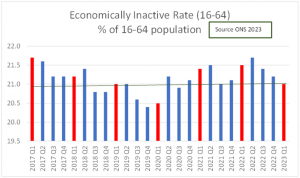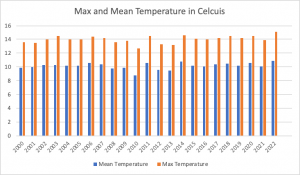Temperatures expected to keep rising in England in next five years
The UN has reported that global temperatures over the next five years will reach new records, with data from the Met Office revealing changes in England’s climate.
Since the year 2000, almost a generation ago, data shows that over the years climate change has steadily increased the average and maximum temperature of England.

Source: Met Office
Environmental activist groups have also grown in the UK, with ‘Extinction Rebellion, one of many groups that have a sizable organisation in Canterbury, Kent, looking to ramp up their ambitions in fighting climate change.
The group plan to stage protests every Friday in Canterbury city centre over the next few months.
Suffering
One committed member, Jessica Hayes, 28, is very concerned about what the data shows.
“Almost my whole life the evidence shows that things are getting worse, with great damage caused within that time,” she said.
The data shows that from the turn of the century, there has been a steady increase in both the maximum and mean of the temperature, with the hottest year on record last year.
“Our governments have failed to make adequate change and prevent a crisis that is getting out of hand, with the world suffering as a consequence we normal people have to force a change,” Jessica said.
“I think though people are really starting to get behind the message with climate activism, as I have seen a rise in membership, and especially during the cost-of-living crisis how much fossil fuel companies are exploiting.”
This comes at a time when according to the World Meteorological Organisation (WMO), the world is heading to break the 1.5C threshold that was established under the Paris Climate Agreement.
The Paris Agreement, signed by 196 countries in 2015, seeks to keep the global average surface temperature increase to 1.5 degrees Celsius more than in pre-industrial times, that is, before the mid 19th century.
The WMO report, however, said that there is a 66% chance that the world will hit 1.5C by 2027. The hottest year so far globally was 2016, when the increase on pre-industrial times was recorded as 1.28C.
The problem is also linked to the oscillating weather system from the Pacific Ocean called ‘El Nino’, the UN warns.
The current system of ‘La Nina’, which causes the world’s temperature to slightly lessen, is ending as it changes into ‘El Nino’.
This would mean, according to WMO reports, that over the next five years there is a 98% chance that one of those will be the hottest on record.
Alhough ‘El Nino’ generally peaks in December, its origins in the Pacific Ocean will take time to have an impact on the UK.
The Met Office have suggested that the impact will be felt this winter with a frostier climate, and that summer next year should be ‘hotter than usual’.
Working outside
This news comes at a price for many in the UK, with one self-employed builder Roy McCartney, 60, saying he worries about the future as “last year’s heat wave was really disruptive and potentially dangerous”.
“Given the nature of my job I have to be outside a lot, and moving around with heavy equipment and gear, but with the heat, I became way less productive,” he said.
“Which is problematic as if I don’t work than I can’t get paid or acquire new jobs, and now I have to accept that this will become the norm, especially as before the longer daylight in the summer allowed for more work.
“Though if I am forced to work I could be at risk of heat-stroke and other ailments caused by the weather.”
Later on, this year, starting in November, COP28 will take place in the U.A.E. Delegations from governments around the world will meet for a two-week summit to discuss steps taken since the Paris Agreement.
Based on current data and UN reports, the focus will be on the current failures of countries complying with the aim of hitting the 1.5C threshold.





